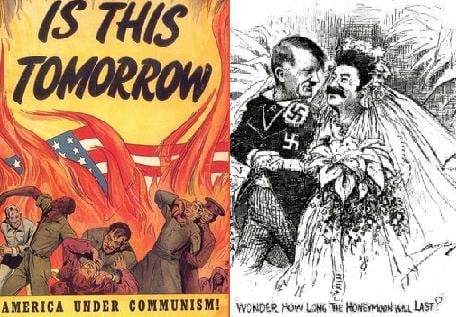
In Russia we have a saying: “Dwell in the past, and you’ll lose one eye; forget the past and you will lose both eyes”.
Amidst all the recent recriminations between Russia, Eastern Europe and the West thrown up by the anniversary of the start of WWII, there’s certainly no danger of anyone going blind. Yet the decidedly monocular perspectives of the parties concerned are not the best means of seeing the truth.
A rough timeline of the confrontation:
1) The OSCE equates Nazism and Communism.
2) Russia retaliates saying Communism saved the world from Nazism, denies Red Army rampage over liberated Europe.
3) Poland blames the Molotov-Ribbentrop pact for starting WWII; Polish president says: “On 17 September, Poland received a stab in the back. This blow came from Bolshevik Russia.”
4) Russia retaliates by blaming Poland for starting WWII with its own non-aggression pact.
Who is right?
Russia Blog has already written about the folly of equating Nazism and Communism. However, the current fashion of exhuming the crimes of Stalin and the USSR as if they were somehow newly discovered is a politicized attack; not so much against Russia as against the Left.
It is no coincidence that every sponsor of such historical muck-raking has been a right wing government, including Poland’s Lech Kaczynski. July’s OSCE resolution was no exception, having been proposed by none other than Lithuania. After all, its ex-US citizen president Valdas Adamkus used to be an active member of the Republican Party and received a medal from Ronald Reagan.
In this light, it’s impossible to deny a glaring ideological subtext to any discussion of Soviet actions in the world, before, during and after WWII.
As Seumas Milne has impressively written, “Battles over history are more about the future than the past”, and those on the right who bring up the spectre of Stalinism are doing so “to prove there is no alternative to the new global capitalist order – and that any attempt to find one is bound to lead to suffering and bloodshed”. After all, as Milne astutely notes, where is these same parties’ condemnation of European colonial crimes and massacres?
In the waning days of the USSR, Gorbachev publicly admitted that the Katyn Forest slaughter was committed by the NKVD and not the Nazis, as the USSR had maintained for over 40 years. ”It is not easy to speak of this tragedy,” he said, “but it is necessary”.
It remains necessary to speak of all the atrocities committed by European powers in the 20th century, from Katyn to Algeria to Vietnam. But there is something cynical and sinister about using historical crimes to smear ideological and/or geo-political adversaries: let’s not forget that the first people to publicly wave around evidence of those Polish killings were…the NAZIs themselves.